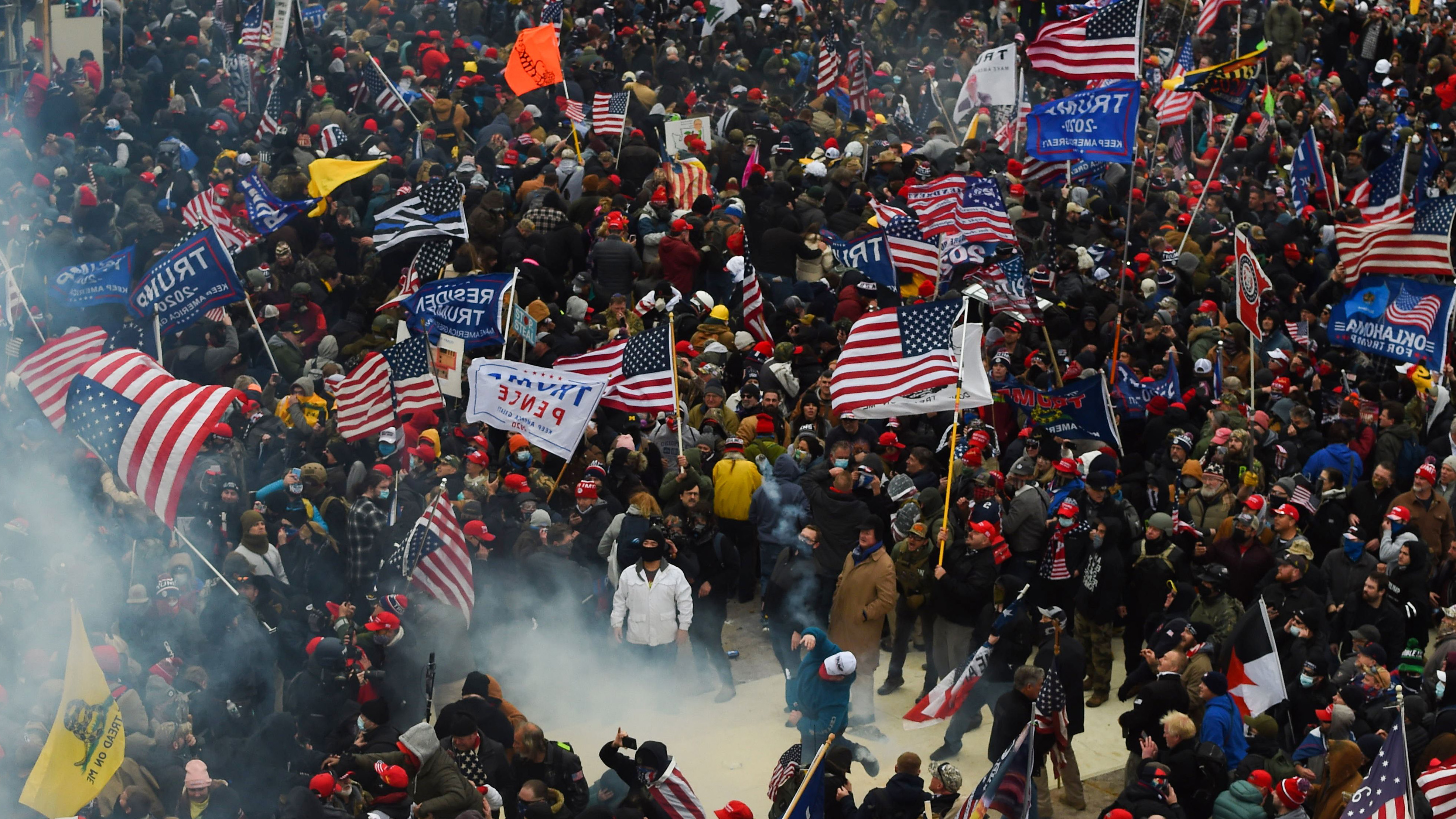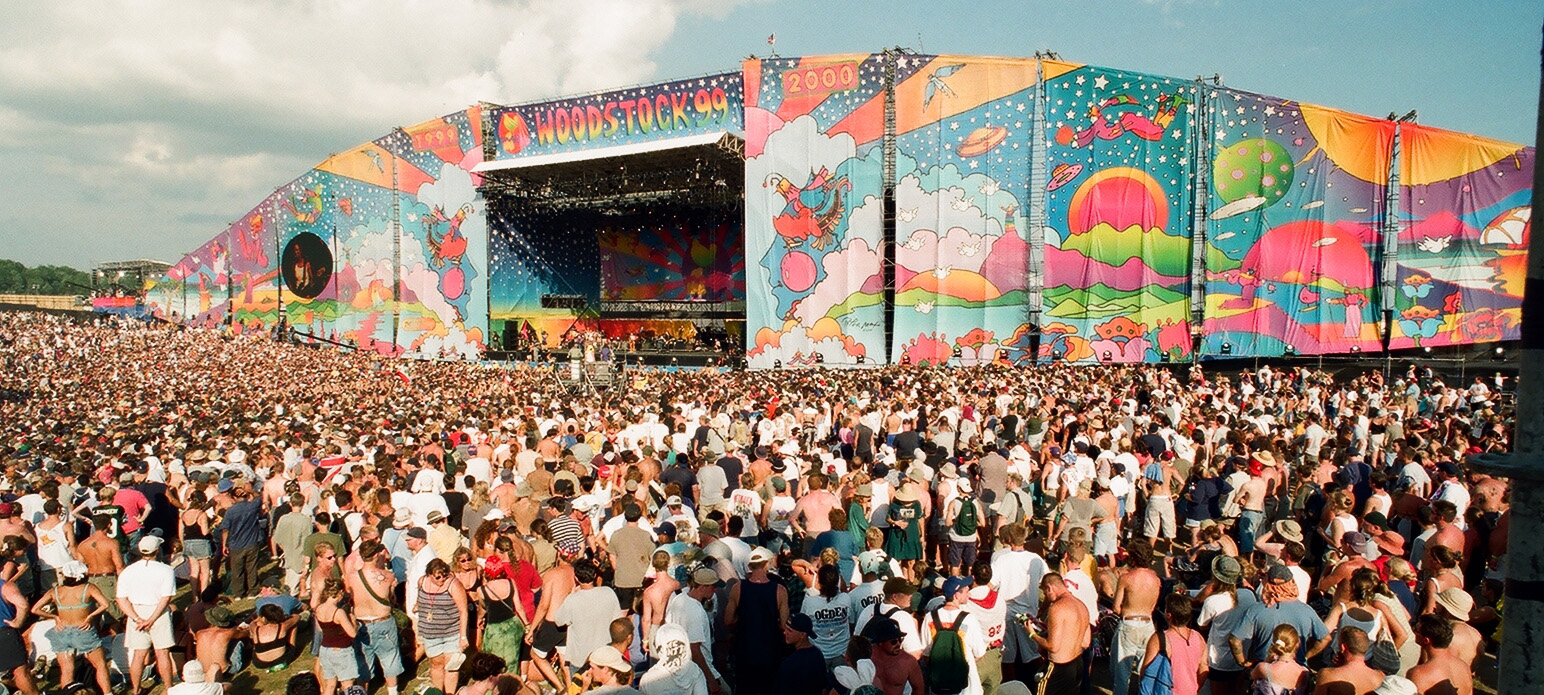What to Watch Verdict
A tough but important look at how the 30th anniversary of the music fest devolved into anarchy. There's no one this shouldn't anger.
Pros
- +
🔥 An unvarnished look at the darkness that erupted from the 1999 music festival.
Cons
- -
🔥 Any sort of consequences get a brief mention in the postscript, but that's it.
Please be aware that Woodstock 99: Peace, Love, and Rage depicts and shows numerous instances of sexual assault of varying degree as it tells the story of the 1999 music festival.
I don't often regret choosing to watch something with my teenage daughter. She grew up in the YouTube era. She's undoubtedly seen far more than I had at her age.
It's context that I worry about. How do put the sights and sounds into context? And it was with that in mind when I called her into the room to check out Woodstock 99: Peace, Love, and Rage on HBO Max. At first it was because I wanted her to see The Offspring — who she knows from the "You're Gonna Go Far, Kid" era — as they were nearly 20 years ago, when us old people first heard them. (OK, nearly 30 years ago for those of us who are among the more punk-inclined.)
I wanted her to get a glimpse of the influence of the first post-MTV generation. It was still very much alive — and the voice of Carson Daily and and on-camera sit-down with the venerable Dave Holmes (who didn't get enough credit back in those days) do an excellent job of explaining how the network was straddling the worlds of pop and nu-metal. I wanted her to see a little taste of a few some bands she knows. Offspring, and Metallica, and a few others she's heard of. I wanted her to give her old man a hard time for telling the story — again — of when he went to Atlanta to see Metallica and Korn and Kid Rock on the Summer Santitarium Tour about a year after Woodstock 99. (With System of a Down opening — and, yes, I listened to them before they were big, thank you very much.)
These were relatively familiar surroundings to me. I was in a band. I listen to loud, aggressive music. And I am now a decidedly middle-aged white man.
My regret in watching with my teenage daughter doesn't come directly from the language or the nudity. Seeing fucked-up naked people is, generally speaking, the sign of a pretty good show. (Though I'd probably implore her, especially now that everyone has a camera in their hand, not actually being said fucked-up naked person.) It's not even from the "Girls Gone Wild" parts of the doc, which were a direct result of the direct-to-video phenomenon of the late 1990s. We all should share in that shame, so I don't take it personally.
The regret doesn't even come from old-man raver Moby being presented as a voice of reason, never mind all the extremely problematic accusations he's faced in recent years. (I actually have less of an issue with that — he was there, and is used to tell a particular part of the story. But that doesn't mean it shouldn't come with a pretty big asterisk.)
I wanted to show my teenage daughter how festivals could be a ton of fun, even if folks got a little out of hand. That's part of being young and dumb. Because it's all part of being out there together, and looking out for each other, even as we're swaying and slamming into one another. I wanted to explain how that's why even all these years later I still listen to what I listen to. It's about sweating and slamming and, on occasion, bleeding together. But it's about doing it together, and making sure everyone's OK enough to do it again.
That's not what Woodstock 99 — either the documentary of the festival itself — proved to be. To be clear, that's actually in praise of the documentary itself, directed by Garret Price for Bill Simmons' Ringer Films. The first in a series of "Music Box" docs does an excellent job laying the groundwork of how the original 1969 festival wasn't actually an idyllic execution of sex, drugs and rock 'n' roll, never mind what the organizers said. (The 25th anniversary show in 1994 gets but a brief mention — which is a shame because while it certainly had its share of insanity, it also had classic mud-fueled sets from the likes of Nine Inch Nails and Green Day.) You immediately get the sense of how Woodstock promoter Michael Lang was fooling himself in 1969, and how he and co-promoter John Scher were fooling themselves three decades later, as seen during recorded daily press conferences.
The regret comes from immediately being able to draw a straight line between the behavior of a large subset of the general population in the late 1990s to the insanity we've seen in 2021. The "fuck your feelings" crowd. The "I'll do what I want because freedom and capital letters" contingent. The regret comes from our not being able to say, "Yeah, things were pretty out of control then. It was wild. It was even more than a little long at some points. But we matured and grew out of it, just as our Baby Boomer parents matured and grew out of it."
Turns out, we didn't.

Those daily pressers turned into Lang and Scher against the media, and how dare they paint an unpleasant picture of their beloved festival. As if literal flowing excrement, heat exhaustion, looting and destruction — and of course sexual assault — was tolerable, so long as it wasn't something everyone experienced. How dare the media — MTV — go against the narrative the organizers wanted to sell. In fact, we disagree with the premise altogether.
Sound familiar?
And that Scher actually goes on camera 20 years later and continues to lie to himself while it's perfectly clear to anyone else who's watching is simply beyond the pale.
"There's no question that a few incidents took place," Scher says. "But if you go back in the records ... we're not talking about 100, or even 50. We're talking about 10."
It gets worse as Scher tries to make it less bad.
"I am critical of the hundreds of women that were walking around with no clothes on and expecting not to be touched," he continues. "They shouldn't have been touched, and I condemn it. But, ya know, I think that women that were running around naked are at least partially to blame for it."
Even 20 years later, who's he trying to convince?
Woodstock 99 tells the story of the weekend largely in chronological order. Things get off to an inauspicious start on Friday afternoon, and go downhill from there. Saturday starts out pretty bad and devolves into worse, punctuated by Limp Bizkit, who were as much a symptom as a cause of the disease, at least as far as the doc is concerned. Korn and Metallica mostly get let off the hook. But the Red Hot Chili Peppers and Megadeth close out the festival on Sunday as fires burned, with the former playing Hendrix's "Fire," and the latter with the usual closer of "Peace Sells ... But Who's Buying?" (The real irony there is that MTV News used that opening bass line for every newscast, but that's some inside baseball stuff.)
The doc is weaved together with the stories from a few men who were there — some as festival-goers, and some as security — and the diary of one of their friends, who is conspicuously absent, save for his handwritten notes. There's a good reason for that, which I won't spoil here but is plenty apparent and is somehow even more shocking than all the examples of sexual assault, save for an EMT's story about a 15-year-old girl. It also — and more importantly — tells the story from the side of women who were there. Some journalists, some festival-goers.
The documentary is predictable, sure. But that's the point. The hindsight is even more clear 20 years later — and that's before you say "holy shit, that looks just like what we saw on January 6." The interviews could be interchanged. You can't help but think about how many people who were totally out of control at Griffiss Air Force Base on July 22-25 as young men might also have been at the U.S. Capitol on Jan. 6, 2021, as 40- and 50-somethings, also lacking common sense and basic humanity.
Woodstock 99 is a hard watch, especially if you're sensitive to scenes of obvious sexual assault. And let's be clear — that's what it is. We've all seen it happen at concerts. We were old enough to know better then, even if we weren't mature enough to understand. That's on us.
It's also on us to make sure it doesn't happen again.
If that means there won't be another Woodstock festival — and the doc reminds us that the 50th anniversary event was scuttled in 2019 — so be it.
Phil spent his 20s in the newsroom of the Pensacola (Fla.) News Journal, his 30s on the road for AndroidCentral.com and Mobile Nations and is the Dad part of Modern Dad.












